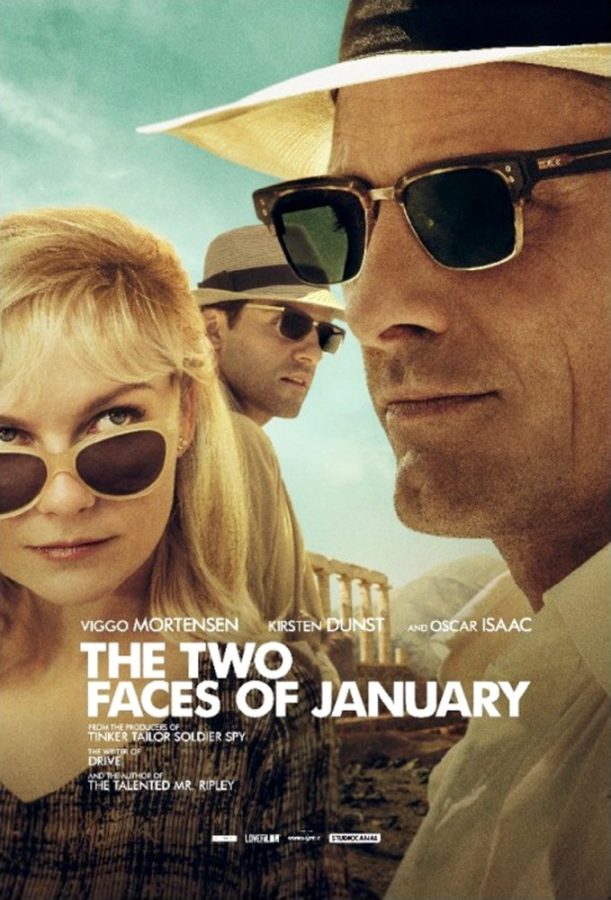An exquisitely shot film with fine performances, “The Two Faces of January” has enough going for it to make it a decent thriller.
It’s 1962, and American Chester MacFarland (Viggo Mortensen) and his wife Colette MacFarland (Kirsten Dunst) are vacationing in Greece, taking a leisurely stroll in front of the Parthenon on the Acropolis in Athens. There, they meet another American expatriate, tour guide Rydal (Oscar Isaac). Rydal has eyes for both of them — Chester because he resembles his recently deceased father and Colette because she’s beautiful.
When a private investigator representing some of Chester’s clients confronts him in his hotel room, it’s revealed that all is not as it seems.
The namesake of the first month, “January,” is the two-faced Roman god Janus. One face looks backward to the past, the other forward to the future. “Janus-faced” refers to someone underhanded and talking out of both sides of their mouth; figuratively, they have two faces.
It turns out both Chester and Rydal are Janus-faced. They lie on different ends of the wealth spectrum, with Chester being able to put himself and Colette up in a five-star hotel, and Rydal merely skating by on the wages of a tour guide and unpublished author.
However, they are both con artists: Rydal takes advantage of foreigners that don’t know the proper conversion rate between drachmas and dollars, and Chester swindled away thousands of dollars from clients on phony investments to achieve his ill-gotten wealth.
With his past caught up with him and the authorities now on the hunt, Chester must flee Athens with Colette and put himself at the mercy of the one person that knows the lay of the land, Rydal.
The increasingly tense love triangle must traverse the countryside as they look for a way out of Greece. Most of this film was shot on location, and the images and locales are sumptuously authentic.
The classical, pristine columns of Athens give way to the dilapidated ruins and labyrinths of Knossos, Europe’s oldest city, with port cities and blindingly white and burnt red rock in-between. On a side note, there’s also just something romantic about seeing Mortensen in a cream-colored suit framed against classic Greek architecture.
Apart from pure aesthetic pleasure, the landscapes reflect how things are going for the trio. In sunny Athens, everything is hunky-dory. But by the time they find themselves in an underground maze on a dark and stormy night, violence erupts.
Preceding the third act are the shifting gazes, loyalties and fidelities of the three main players. Mortensen, Dunst and Isaac hint at what each of their characters are thinking and feeling, but we’re never really sure of where exactly they stand. Colette is drifting away from her husband as he becomes more and more paranoid, but would she ever leave him? Chester and Rydal trust each other about as far as they can throw each other, but will they ever come to blows? They are relatively pedestrian questions for a thriller, but they do keep the viewer guessing and going forward.
There’s also a motif of fathers surfacing every once in awhile. Rydal’s father gave him everything growing up, and Chester’s father was poor. The whole thing seems sketched and never really amounts to anything significant. It acts as something to latch onto with these characters, but it can’t shoulder the weight.
The film is the directorial debut of Hossein Amini, who wrote the 2011 Ryan Gosling film “Drive.” It is a solid, structurally sound first outing, but, admittedly, it registers as a little underwhelming.
There’s nothing here that’s going to redefine the genre or, in fact, really stay with you — except for perhaps the gorgeous scenery. I mean, it’s not a terrible thing to have a two-hour trek through beautiful Greece.
Grade: B
_______________
Follow Alex Guyton on Twitter.









